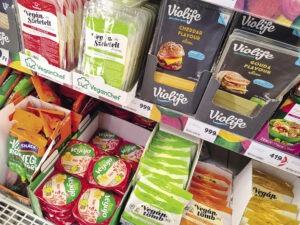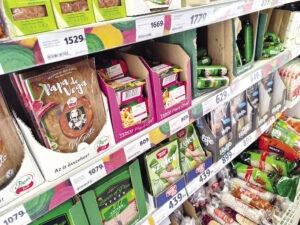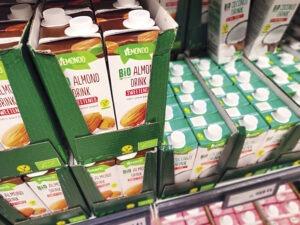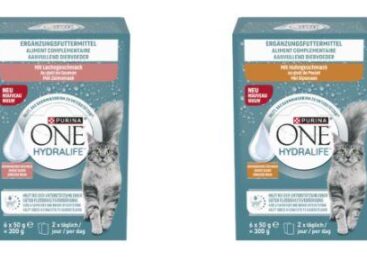Plates and glasses going green
Demand for plant-based products has been growing steadily in recent years. The companies interviewed in the article are working from different market positions, but with the same commitment to develop a plant-based assortment. The experiences they share clearly outline the direction in which consumer preferences are shifting and which product categories are evolving the fastest.
This article is available for reading in Trade magazin 2025/5.
With own brands, in a price-sensitive way

Tímea Tulkán
head of marketing and own brand
METRO
According to Tímea Tulkán, head of marketing and own brand at METRO Kereskedelmi Kft., the behaviours of three distinct consumer groups are shaping demand for plant-based products: those who have some kind of food sensitivity, consumers who choose plant-based options because of ethical convictions or environmental concerns, and shoppers who prefer to follow a free-from diet mainly because they are trendy.
“We are constantly looking at what new demands are emerging, where it would be worthwhile to develop our own brand assortment. Our METRO Chef veggie range is being expanded with new products in the same spirit”,
says Tímea Tulkán.
In her view those who choose free-from products for health reasons are paying particular attention to prices. In this segment, the preference for own brands (either METRO Chef or Aro) is stronger.

The offering has somewhat changed as several A-brand manufacturers have retreated from competition
A diverse diet and a conscious future
Lidl’s goal is to satisfy the needs of customers to the full by gradually expanding the selection of foods that can be integrated into a healthy diet. Lidl is also committed to organic products, as demonstrated by the steadily increasing share of these in stores. With a growing demand for vegan options in Hungary, the discounter chain has a large selection of plant-based alternatives: its private label Vemondo vegan and vegetarian product line includes more than 60 permanent and seasonal products. In January 2024 the chain began to reduce the prices of these products.

Judit Tőzsér
head of company comunication
Lidl Magyarország
“By 2050 our product range will be further aligned with the Planetary Health Diet (PHD). By 2030 we aim to increase the proportion of plant-based foods – plant protein sources, whole grains, vegetables and fruits – sold by 20% if compared to 2023”,
says Judit Tőzsér, head of company communication.
More vegetables, less soy

Katalin Nemes-Vidács
senior brand manager
Nestlé Hungária
Katalin Nemes-Vidács, senior brand manager of Nestlé Hungária Kft. says the meat substitute market resumes growth in 2024 after a slowdown in 2023.
“These products start from a difficult position, because the majority of Hungarians are meat eaters. Our goal isn’t to replace meat consumption completely, but rather to contribute to a varied diet with options that are high in vegetable and can be used to diversify daily meals”,
says Katalin Nemes-Vidács.
Instead of purely soy-based meat substitutes, shoppers all over the world are looking for high vegetable content, even soy-free products. In 2024 sales by the Garden Gourmet brand grew beyond expectations and, acquiring an almost 30% market share in the category.
Ideal plant-based solutions
The Violife brand of the Flora Food Group realised a volume sales growth in 2024 that was way above the market average.

Zsolt Babják
head of sales
Flora Food Hungary
“Prices are also rising in this area: according to NIQ’s report, the average price increase for plant-based cheese alternatives exceeded 7% in 2024. Sales statistics show that people who are just experimenting with plant-based foods are more likely to try something new if it is available at a reduced price”,
says Zsolt Babják, head of sales at Flora Food Hungary Kft.
Flora Food Group’s award-winning Violife vegan cheese substitutes make it easy for anyone to switch to a plant-based diet. The product portfolio also includes the 100% plant-based Rama Butter Alternative range, which many people choose as a genuine butter substitute. Rama Crema whipped and cooking creams (31% whipped and 15% cooking versions) are among the latest innovations in baking and cooking.

Developments are making plant-based alternatives tastier and more appealing to a wider range of consumers
Vegan grilling sausages
In the category of meat substitutes quality and taste experience have improved spectacularly. Pápai Hús has become a dominant player in the vegan meat substitute market, partly due to the fact that it also produces the private label ranges for several retail chains. In addition to this, their own branded products are appearing on the shelves of a growing number of stores.

Zsuzsa Takácsné Rácz
sales director
Pápai Hús
“We also wish to appeal to flexitarians and meat lovers, so we implement promotions regularly to get our products to as many people as possible”,
reveals sales director Zsuzsa Takácsné Rácz.
This year the company is launching new flavoured sandwich toppings and they plan to strengthen their presence in the barbecue segment with vegan grilling sausages.
New strategies

István Káposztás
sales director
König-Units
István Káposztás, sales director of König-Units Kft. reports that the cost of living has increased worldwide and consumers are changing their habits to adapt to the inflationary pressure. He also points out that people like to cook at home, as food prepared from carefully selected ingredients is often more economical than the ready-meals available in shops. Many people are taking a meat-free day – mainly for health reasons, but also because of high food prices.
The company’s Liana gluten-free flour mixes are aimed at housewives who love to bake, while the “Il Pane di Anna” product line is for gluten intolerant consumers. For vegetarians and vegans they are offering DIJO Tex-Mex-style products, including tortillas, chips and salsa sauces.
“We wish to maintain consumer interest not only with traditional price promotions, but targeted ones as well. We are launching a digital/social advertising campaign for our Naturale Vegan products”,
says István Káposztás.

Discounters have the largest share of vegetable and organic food sales
On a green basis
In 2024 altejego doubled its sales vs. the previous year, which reflects the brand’s strengthening market position very well; consumer favourites are pea and oat drinks.
“We rolled out the Dryk brand in 2023, initially with barista variants. By the end of 2024 the full range became available. This year’s new product is the 250ml cocoa pea drink, which is unique in Hungary”,
informs Ádám Huszár, managing director of altejego.
One of altejego’s long-term goals is to expand its product selection with international brands that aren’t available in Hungary yet. The company’s ambition is to bring more premium quality, sustainable and innovative plant-based drinks to domestic consumers.
Products for children

Gábor Egervári
managing director
Sales System Hungary
Gábor Egervári, managing director of Sales System Hungary Kft. reports that in 2024 the volume of domestic crop production was down compared to the previous year. Around 90% of medicinal herb cultivation is currently done abroad.
”2024 brought great changes for us: retailers are increasingly interested in special products made by smaller companies. As a result, our presence is growing not only on the domestic market but also abroad”,
explains Gábor Egervári.
Their pricing takes into account the needs of less well-off consumers: the price of a daily portion doesn’t exceed HUF 200 so a 30-day package costs only HUF 5,500. The company’s latest innovation is the RedPower Kids range, created in partnership with musical group Alma Együttes. In the second half of the year, they will also come out with new packaging formats: 330ml, 500ml and 750ml PET bottles. //
Related news
SIRHA Budapest 2026 – The biggest domestic celebration of the HoReCa sector
🎧 Hallgasd a cikket: Lejátszás Szünet Folytatás Leállítás Nyelv: Auto…
Read more >Related news
II. Green Gastronomy – Marketing Communication Workshop organized by the MMSZ HoReCa and Green Section
🎧 Hallgasd a cikket: Lejátszás Szünet Folytatás Leállítás Nyelv: Auto…
Read more >Retail sales of organic products in Hungary increased by 13.9% – our country is the second fastest growing market in the European Union
🎧 Hallgasd a cikket: Lejátszás Szünet Folytatás Leállítás Nyelv: Auto…
Read more >









